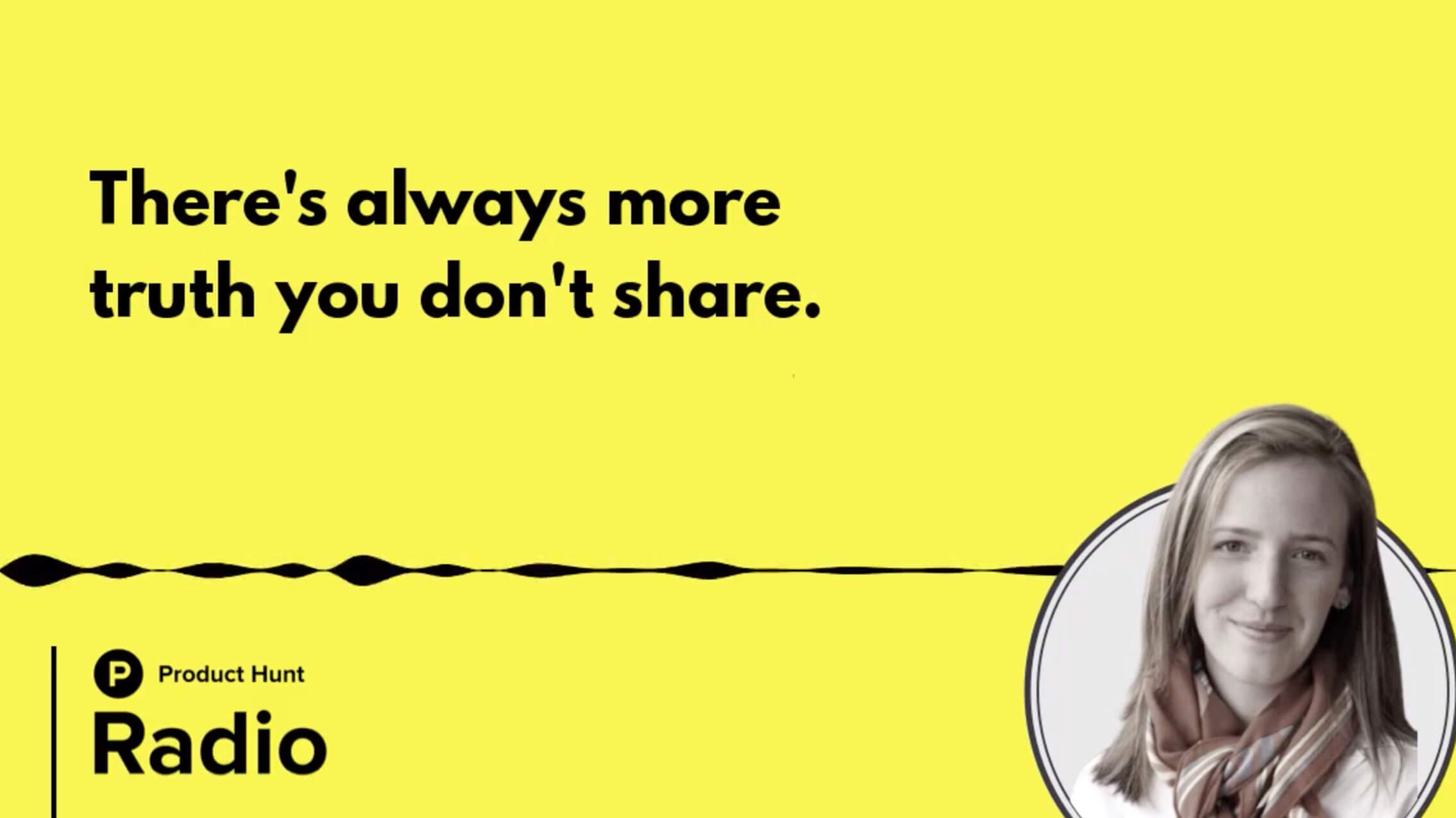In this featured conversation between Product Hunt’s Ryan Hoover and Danielle Morrill, we learn why professional success doesn’t always lead to personal fulfillment, and what to do about it. Can a perspective shift help us succeed while also being kinder to ourselves? How can we deepen our empathy and increase the amount of meaningful work we do?
Danielle offers a rare combination we don’t always find on popular tech podcasts: the courage to be emotionally unguarded alongside the professional accomplishments that few manage to achieve. Beneath routine questions about what she’s done and what’s helped her along the way, Danielle’s answers hint at her struggle to redefine fulfilling work beyond “chasing unicorns” and “the billion-dollar startup dream.”
Danielle was employee #1 at Twillio, and has been blogging about start-ups from a keen, data-driven lens since 2013. Her blog would eventually evolve into Mattermark, a company she and her husband, Kevin Morrill, co-founded. FullContact acquired Mattermark in 2017, which brought Danielle and Kevin to Denver, Colorado where they currently live. Danielle has since joined GitLab after a professional sabbatical in 2018.
The line between marketing, self-care, and ‘performance art’
It goes without saying that Danielle is a very effective communicator. After acquiring Twilio’s first 100k users and growing a blog into an MVP of a startup, it’s clear her writing is uniquely able to ask and answer questions with a transparency that resonates with people. Danielle proves that effective communication can build a community around a cause or brand. That said, the internet is flooded with click-bait and impersonal listicles which fail to connect us in a real, unique way.
When content does succeed at starting and sustaining a meaningful conversation, does the rush from the engagement cause us to double-down on what works? Can our data sometimes trick us into writing what makes us look and feel good at the expense of what’s authentic and true?
Even writing this blog post, it was tempting to summarize Danielle’s ideas, list out her recommendations under an attention-grabbing headline, and then check the box beside ‘weekly blog post.’ Going with what’s good over what’s easy feels like the hardest part about blogging, which is why, as Danielle explains, “how-to’s” and other prescriptive content just add to the noise online.
Many attempts at content marketing fail to make our customers care because of what Danielle refers to as “performance art.” Connecting to the people who are rooting for us becomes harder when we use marketing as a means to “cast ourselves in the best possible light.” According to Danielle, this can become tedious and self-defeating if done without self-awareness.
Coping with loneliness as a founder
Perhaps it’s this online image of perfection we create that leads to isolation and loneliness when starting a business. Building a product, deciding to bootstrap or raise, and hiring and scaling are all difficult challenges that are only compounded by the false narrative that “our struggles are our own.”
Danielle doesn’t explicitly state it, but listeners can get a sense of how her time on sabbatical spent reading and reflecting helped her differentiate between the concepts of solitude and loneliness. Danielle says, getting to “try on other people’s lives” is her big takeaway from reading – especially fiction. Transforming from a busy CEO who preferred summaries of books over the real thing, into a person who’s making time to design a life with intention – Danielle’s evolution is the inspiration we need to resist the urge to undermine ourselves through superficial communication.
Danielle suggests that playing Tetris with your calendar to optimize yourself like a robot might be an effective way to chunk in more to-do’s, but it deprives us of having a story about how we spend our days. Danielle’s tip is to use our calendars as a way to narrate our days. That way, when we reflect back on whether our time accurately reflects our values (she reserves Sunday for introspection) we aren’t just being kinder to ourselves, we’re working with the human need for cohesiveness instead of against it.
Being less transactional with ourselves also transforms how we relate to others. We can transcend the urge to small-talk on social media during those spare moments and thus, reclaim our time. It doesn’t feel like we’re undermining ourselves when we buy into the culture of busy, and it doesn’t feel like we’re undermining others when we’re pumping out content and tweeting for shares because that’s what everyone else is doing 🤷. Danielle’s suggestions are a recounting of what’s worked for her life – and feel a bit like a hat-tip to Mark Twain’s famous quote, “Whenever you find yourself on the side of the majority, it is time to pause and reflect.”
Closing thoughts
What prompted me to dive deep into this particular episode is the nuance and wisdom layered into what seems like just a run of the mill interview. Danielle might be considered wildly successful by many standards we’d apply to tech founders, but she’s uniquely able to make her struggles feel real without using them to play the victim. This is so rare and so important. Am I the only one who detects the mild disdain in her voice when she reflects on how she used to think or when she talks about what passes for marketing online these days? Personal growth isn’t meant to be comfortable. I really relate to how hard it feels to transcend emotional challenges, but I also try to look back on my mistakes with some compassion for myself. I totally agree with Danielle that this sounds easy but isn’t. This conversation is a refreshing glimpse into the perspective of someone who accepts the struggle required to grow and mature, yet isn’t trying to fake or sugarcoat the process.
While our team continues to search for ways to grow Audiogram without selling our souls, we’ll continue to seek out likeminded founders and creators by doing these deep dives into really helpful podcast episodes. If you’re also creating something, whether it’s a podcast or something interesting for social, hope you don’t mind me asking: Have you given Audiogram a try recently?


